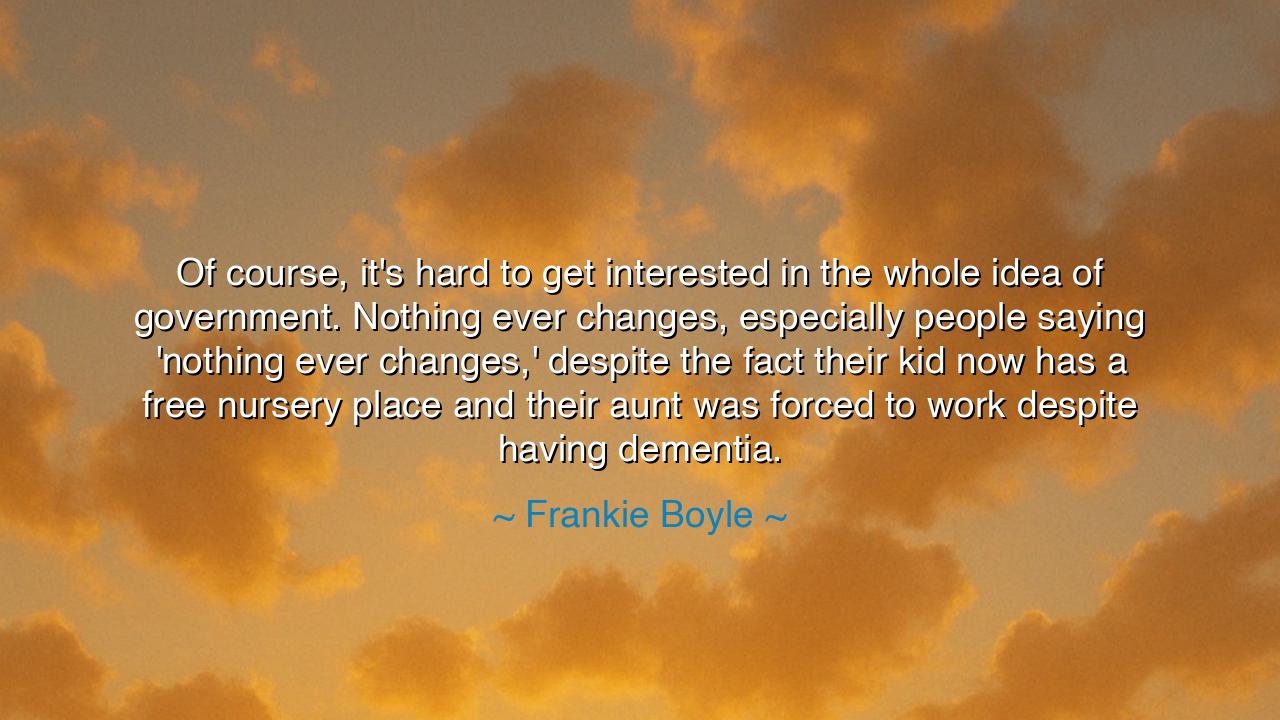
Of course, it's hard to get interested in the whole idea of
Of course, it's hard to get interested in the whole idea of government. Nothing ever changes, especially people saying 'nothing ever changes,' despite the fact their kid now has a free nursery place and their aunt was forced to work despite having dementia.






In the biting, paradoxical wisdom of the modern age, the comedian and social critic Frankie Boyle once said: “Of course, it's hard to get interested in the whole idea of government. Nothing ever changes, especially people saying 'nothing ever changes,' despite the fact their kid now has a free nursery place and their aunt was forced to work despite having dementia.” Though his words carry the edge of irony, they reveal a truth older than satire itself—the blindness of a people to the slow, relentless tide of change, and the tragic contradiction between what we believe about politics and what quietly unfolds before our eyes. In this single thought, Boyle exposes both the apathy and hypocrisy of modern society: that we dismiss government as powerless or corrupt, even as it shapes the most intimate corners of our lives.
To understand this saying, one must first grasp the spirit from which it was spoken. Frankie Boyle, known for his dark wit and cutting social commentary, often turns his humor toward the absurdities of power and the contradictions of human nature. In this quote, he speaks not only as a comedian, but as a philosopher of the common man—mocking the defeatism that has settled over public life. When he says “nothing ever changes,” he does not mean that government is stagnant; he means that people believe it is. And that belief, repeated and accepted, becomes a kind of self-imposed blindness—a shield against engagement, against responsibility, against hope.
Yet, beneath his sarcasm lies compassion. Boyle points to the quiet realities that contradict this cynicism: a child receiving free nursery care, an aunt forced by policy to labor beyond her capacity. Both are the direct results of government decisions—acts of compassion and cruelty, progress and failure intertwined. Through this contrast, he reminds us that government is not an abstraction; it is the living reflection of our collective choices, our moral compromises, and our values. Even when we turn away in disgust or disinterest, the machinery of policy continues to shape our destinies. The idea that “nothing ever changes” is not truth—it is surrender.
The ancients, too, understood this paradox. In Athens, birthplace of democracy, there were always those who cried, “The system is broken!” or “Politics is corrupt!” even as they enjoyed the freedoms, roads, and theaters that governance made possible. The philosopher Aristotle warned that apathy was the beginning of tyranny, for when citizens lose faith in their ability to effect change, they abandon their power—and others seize it. Likewise, in the Roman Republic, when citizens grew cynical and withdrew from civic life, the strongmen rose, declaring themselves saviors of a weary people. Thus, the ancient lesson echoes through Boyle’s modern satire: disengagement is not rebellion, it is surrender; indifference is not wisdom, but weakness disguised as wit.
Consider a more recent story—the British welfare reforms of the early 21st century. For years, citizens lamented that “politicians are all the same,” that “nothing ever changes.” Yet those very reforms changed the lives of millions: some for better, through expanded early education and childcare; others for worse, through harsh austerity measures that stripped away protections for the elderly and sick. Policies that seemed distant became deeply personal, shaping family life, health, and dignity. Boyle’s example of a child in a free nursery and an aunt forced to work with dementia are not fiction—they are the lived consequences of public apathy. Through his wit, he forces us to see what we would rather ignore: that every vote cast or withheld is a moral act, and every shrug at politics is a silent endorsement of power as it stands.
In truth, Boyle’s irony conceals a plea—a call for awareness and engagement. He mocks the claim that “nothing ever changes” not to sneer at despair, but to awaken those who hide behind it. For even in the slow and imperfect grind of government, the gears of change do move. A law passed, a tax shifted, a policy rewritten—these may seem small, but over time they carve the shape of a nation. Those who claim power is useless have simply lost the patience to see its fruits. The ancients would call this loss of faith a spiritual decay, the corrosion of civic virtue. The wise would say: though change comes slowly, it is still worth fighting for, for it is the only path by which suffering can be eased.
Therefore, my children of this restless century, take heed of this paradox. Do not mock the system and then live within its comfort. Do not curse the government and then rely upon its mercy. See the hidden changes that have grown like roots beneath your feet—some nourishing, some poisonous—and recognize that they are yours. To believe “nothing ever changes” is to surrender the moral duty of citizenship; to act, however humbly, is to shape the course of history.
So, let Frankie Boyle’s irony become your awakening: laugh at the absurdities of power, but never abandon the sacred responsibility to question, to vote, to care. For the fate of every society rests not in the hands of its rulers alone, but in the hearts of its people. And though the wheel of change turns slowly, it will always turn—driven not by despair, but by those who refuse to give up on the possibility of a better world.






AAdministratorAdministrator
Welcome, honored guests. Please leave a comment, we will respond soon